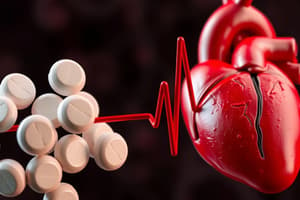Podcast
Questions and Answers
Which of the following conditions is a contraindication for the use of disopyramide?
Which of the following conditions is a contraindication for the use of disopyramide?
What is the primary reason lidocaine is only administered parenterally?
What is the primary reason lidocaine is only administered parenterally?
What happens to the effect of lidocaine on Na channels in depolarized cells?
What happens to the effect of lidocaine on Na channels in depolarized cells?
What is the half-life of lidocaine?
What is the half-life of lidocaine?
Signup and view all the answers
What is the effect of disopyramide on ventricular contractility in patients with pre-existing ventricular failure?
What is the effect of disopyramide on ventricular contractility in patients with pre-existing ventricular failure?
Signup and view all the answers
What is the effect of lidocaine on the QT interval?
What is the effect of lidocaine on the QT interval?
Signup and view all the answers
Which of the following is NOT a therapeutic use of lidocaine?
Which of the following is NOT a therapeutic use of lidocaine?
Signup and view all the answers
What is the main advantage of mexiletine over lidocaine?
What is the main advantage of mexiletine over lidocaine?
Signup and view all the answers
What is the primary mechanism of action of Class Ic antiarrhythmics?
What is the primary mechanism of action of Class Ic antiarrhythmics?
Signup and view all the answers
Which of the following adverse effects is NOT commonly associated with lidocaine?
Which of the following adverse effects is NOT commonly associated with lidocaine?
Signup and view all the answers
What is the primary indication for mexiletine in patients with chronic pain?
What is the primary indication for mexiletine in patients with chronic pain?
Signup and view all the answers
Which of the following is a characteristic of lidocaine?
Which of the following is a characteristic of lidocaine?
Signup and view all the answers
What is the primary goal of using diltiazem in atrial fibrillation and atrial flutter?
What is the primary goal of using diltiazem in atrial fibrillation and atrial flutter?
Signup and view all the answers
Which of the following is a contraindication for using diltiazem?
Which of the following is a contraindication for using diltiazem?
Signup and view all the answers
What is the duration of action of adenosine?
What is the duration of action of adenosine?
Signup and view all the answers
What is the effect of hyperkalemia on ectopic pacemakers?
What is the effect of hyperkalemia on ectopic pacemakers?
Signup and view all the answers
What is the indication for magnesium therapy in arrhythmias?
What is the indication for magnesium therapy in arrhythmias?
Signup and view all the answers
What is the effect of hypokalemia on the heart?
What is the effect of hypokalemia on the heart?
Signup and view all the answers
What is the effect of Na channel blockers on ventricular cells in terms of arrhythmia?
What is the effect of Na channel blockers on ventricular cells in terms of arrhythmia?
Signup and view all the answers
What is the bioavailability of procainamide when administered orally?
What is the bioavailability of procainamide when administered orally?
Signup and view all the answers
What is the effect of procainamide on the QRS duration of the ECG?
What is the effect of procainamide on the QRS duration of the ECG?
Signup and view all the answers
What is the effect of procainamide on the peripheral vascular resistance?
What is the effect of procainamide on the peripheral vascular resistance?
Signup and view all the answers
What is the anticholinergic effect of procainamide compared to other type IA drugs?
What is the anticholinergic effect of procainamide compared to other type IA drugs?
Signup and view all the answers
What is the effect of procainamide on the ventricular effective refractory period (ERF) and action potential duration (APD)?
What is the effect of procainamide on the ventricular effective refractory period (ERF) and action potential duration (APD)?
Signup and view all the answers
What is a common response to arrhythmias associated with excessive cardiac adrenergic stimulation?
What is a common response to arrhythmias associated with excessive cardiac adrenergic stimulation?
Signup and view all the answers
What is the effect of K channel blockers on the plateau duration?
What is the effect of K channel blockers on the plateau duration?
Signup and view all the answers
What is the adverse effect of K channel blockers that increases with prolongation of the plateau duration?
What is the adverse effect of K channel blockers that increases with prolongation of the plateau duration?
Signup and view all the answers
Which of the following K channel blockers exhibits reverse use-dependency?
Which of the following K channel blockers exhibits reverse use-dependency?
Signup and view all the answers
What is the primary use of esmolol?
What is the primary use of esmolol?
Signup and view all the answers
What is the systemic bioavailability of amiodarone?
What is the systemic bioavailability of amiodarone?
Signup and view all the answers
Study Notes
Disopyramide and Contraindications
- Disopyramide is contraindicated in patients with heart failure due to its negative inotropic effects.
Lidocaine Administration
- Lidocaine is primarily administered parenterally because its bioavailability is significantly reduced when taken orally.
Lidocaine Effect on Sodium Channels
- Lidocaine preferentially blocks sodium channels in depolarized cells, making its effect more pronounced in active tissues.
Lidocaine Half-Life
- The half-life of lidocaine is approximately 1.5 to 2 hours.
Disopyramide and Ventricular Contractility
- Disopyramide decreases ventricular contractility, particularly harmful for patients with pre-existing ventricular failure.
Lidocaine and QT Interval
- Lidocaine does not significantly prolong the QT interval, making it safer in terms of arrhythmia risk.
Lidocaine Therapeutic Uses
- Lidocaine is not typically used for chronic pain management as its primary applications focus on acute ventricular arrhythmias and local anesthetic purposes.
Mexiletine vs. Lidocaine
- Mexiletine offers the advantage of oral administration compared to lidocaine, which requires parenteral delivery.
Class Ic Antiarrhythmics Mechanism
- The primary mechanism of action for Class Ic antiarrhythmics involves robust blockade of sodium channels, leading to prolonged depolarization.
Lidocaine Adverse Effects
- Common adverse effects of lidocaine do not typically include significant hypotension or bradycardia.
Mexiletine in Chronic Pain
- Mexiletine is indicated for managing neuropathic pain in chronic pain patients.
Lidocaine Characteristics
- Lidocaine is a class 1B antiarrhythmic with rapid clinical effects and relatively short duration of action.
Diltiazem in Atrial Fibrillation
- The main goal of using diltiazem in atrial fibrillation and flutter is rate control by slowing conduction through the AV node.
Diltiazem Contraindications
- Diltiazem is contraindicated in patients with severe hypotension or advanced AV block.
Adenosine Duration of Action
- Adenosine has a very short duration of action, typically lasting only seconds in the cardiovascular system.
Hyperkalemia and Ectopic Pacemakers
- Elevated potassium levels (hyperkalemia) can increase the excitability of ectopic pacemakers, potentially leading to arrhythmias.
Magnesium Therapy Indication
- Magnesium therapy is primarily indicated for the treatment of torsades de pointes and other specific arrhythmias.
Hypokalemia on Cardiac Function
- Hypokalemia can lead to increased automaticity and a higher risk of arrhythmias.
Sodium Channel Blockers and Ventricular Cells
- Sodium channel blockers can reduce the likelihood of arrhythmias by stabilizing the cardiac membrane potential in ventricular cells.
Procainamide Bioavailability
- Procainamide has approximately 75% bioavailability when administered orally.
Procainamide Effect on ECG
- Procainamide prolongs the QRS duration on the ECG, indicating a slowing of conduction.
Procainamide and Vascular Resistance
- Procainamide decreases peripheral vascular resistance, which may lead to hypotension.
Anticholinergic Effects of Procainamide
- Procainamide has less pronounced anticholinergic effects compared to other Type IA antiarrhythmic drugs.
Procainamide on Refractory Periods
- Procainamide increases the ventricular effective refractory period (ERF) and prolongs action potential duration (APD).
Arrhythmias and Cardiac Adrenergic Stimulation
- A common response to arrhythmias related to excessive adrenergic stimulation includes increased heart rate and contractility.
Potassium Channel Blockers
- Potassium channel blockers extend the plateau phase of cardiac action potentials.
Adverse Effects of Potassium Channel Blockers
- The risk of adverse effects, such as torsades de pointes, increases with the prolongation of the plateau duration caused by potassium channel blockers.
Reverse Use-Dependency in Potassium Channel Blockers
- Dofetilide is a potassium channel blocker known to exhibit reverse use-dependency, with increased effect at slower heart rates.
Esmolol Primary Use
- Esmolol is primarily used for the rapid control of heart rate in perioperative settings or acute tachyarrhythmias.
Amiodarone Bioavailability
- Amiodarone has a systemic bioavailability of approximately 20-30%, which is influenced by its extensive tissue distribution and long half-life.
Studying That Suits You
Use AI to generate personalized quizzes and flashcards to suit your learning preferences.
Description
This quiz covers the effects of Na channel blockers on ventricular cells, particularly Procainamide's pharmacokinetics and its administration through intravenous and intramuscular routes. Test your knowledge on how Procainamide prevents arrhythmia and its impact on action potential and refractory period.




